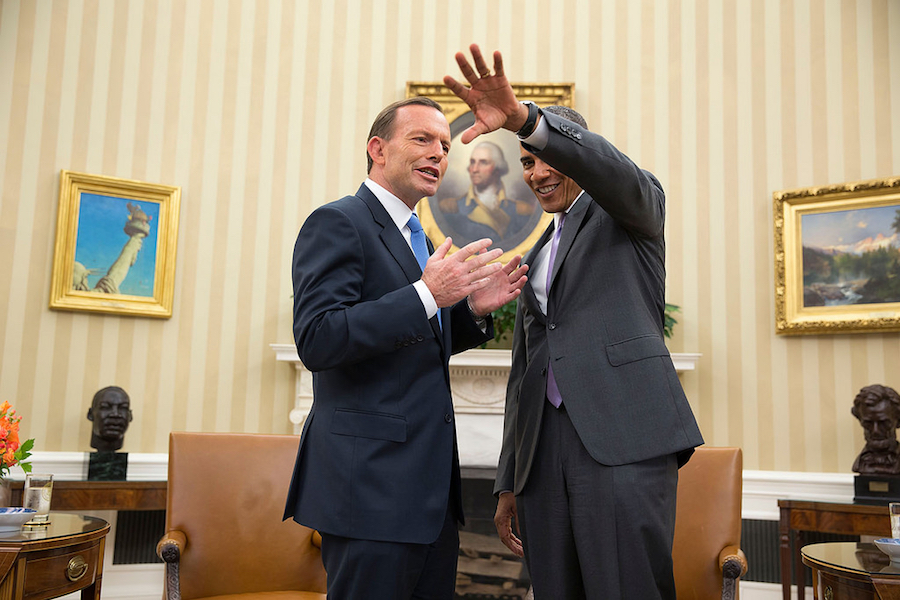
Tony Abbott in the U.S.: A Note on Fawning and U.S.-Australian Ties
The most grotesque spectacle in recent years has been that of an Australian prime minister on tour in the United States. The bib has to be procured to capture the drool. Fawning admiration accompanies unqualified assertions of promise and valour in the face of common enemies and those who do not share the “values” of each country. John Oliver’s “Last Week Tonight” segment about Other Countries’ presidents of The United States saw Abbott’s debut in the fawnocracy of US power. “Meet Australia’s President of the United States, Prime Minister Tony Abbott, the instigator of a wink-related scandal. He sometimes puts his foot in his mouth and other times chooses to say nothing at all.”
Leaving aside the glaring inadequacies of the individual occupying the office, the open volunteering of troops to US-directed conflicts without consultation, engagement and parliamentary approval would be problematic, if not patently irregular. Blood and booty being offered on a platter for another power, bypassing the entire structures of consultation, denies, rather than confirms, the independence of a country.
President Barack Obama was certainly intent on making the Australian prime minister go weak at the knees. Australia was one of only a handful of countries “that we always know we can count on, not just because they share our values, but we know we can count on them because they’ve got real capacity.”
At that point, Abbott was swooning. “Aussies know how to fight. I like to have them in a foxhole when we are in trouble.”
Australian and US personnel have been mingling in many a foxhole of late. The Abbott visit saw an extension of the military arrangements put in place by Prime Minister Julia Gillard in 2011 dealing with the deployment of US military personnel in Darwin. Some 1,150 are already deployed as part of the “marine air ground task force,” with another 2,500 to be deployed by 2016-17. The Abbott government has also given a boost to military spending, something that did not escape the President’s attention. Even in times of austerity, militarists can shine through.
In Obama’s words, “In addition to the marines that are now in Darwin and the rotations that have been established, we actually have arrived at additional agreements around force postures that will enhance the bilateral cooperation between our militaries and give us additional reach throughout this very important part of the world. And we are grateful for the cooperation there.”
Relationships of this sort can become attempts to patch up glaring differences. Under the Obama administration, the climate change elephant in the room has made its presence felt. The White House’s spokesman, Jay Carney, stated Obama’s stress that both countries adopt “ambitious domestic climate change policies as the basis of a strong international response.”
To the Australian prime minister, these are merely matters of embellishment, hysteria occasioned by the confused and muddled. Keep calm, and keep extracting the earth’s finite resources. We won’t be around to see the rest, in any case. For Abbott, as de facto leader of an American forward base, climate is less important than military awareness. The Obama administration and Abbott’s spectacularly insular front bench, are unlikely to have any falling-outs. There is, after all, only one partner leading this dance.
That is precisely the sort of lead that may imperil Australian security in future. Former Australian Prime Minister, Malcolm Fraser, may well be from Abbott’s side of the political fence, but he is far from being at one on various matters with the current government. “Our armed forces are so closely intertwined with theirs [the US] and we really have lost the capacity to make our own strategic decisions.”
The integration of the respective forces, the growing relevance of the Pine Gap base, would give other powers little cause for assuming that Australia was not a vital extension of US power. That Australia would become a target, notably its Pine Gap facility, in the event of a conflict between the US and China, is more than a touch plausible.
For Fraser, the US has made a fundamental error – seeing China as a Soviet threat redux, a power in need of careful yet choking containment. It has made such errors before, misunderstanding opponents, embarking on disastrous military missions, and retreating with its enormous tail between galloping legs. Fraser is still bruising from Australia’s overly enthusiastic backing, with military forces, of the Vietnam conflict. At the time, he was a strident supporter.
Subsequent revelations that the Johnson administration had been less than forthcoming about North Vietnamese intentions, concealing various CIA assessments, continue to rankle. “Vietnam was a busted flush by the time we made our major commitments to it. CIA analysts, who were right about Iraq, were right about Vietnam. But they were ignored by the Kennedy and Johnson administrations.”
It is the sort of cyclopean adventurism that is bound to land Australia in the soup. Such occasions should have given Australian policy makers food for thought – to reassess “our policies and [decide] that we should exercise greater independence.” Not, it would seem, under Abbott’s watch, where enthusiasm and uncritical support prove indispensable and distorting.
